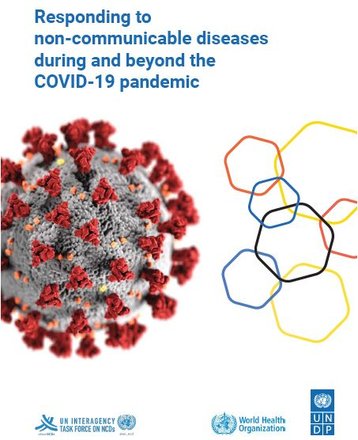Respuesta a las enfermedades no transmisibles durante y después de la pandemia de COVID-19: informe político
 Diana Gosálvez Prados
— última modificación 31/03/2022 11:27
Diana Gosálvez Prados
— última modificación 31/03/2022 11:27

La respuesta a las enfermedades no transmisibles (ENT) durante y después de la pandemia de COVID-19 describe por qué una acción enérgica contra las ENT debe ser parte integrante de la respuesta a COVID-19, de la recuperación y de la vuelta a la normalidad, así como las medidas que deben adoptarse inmediatamente y a largo plazo.
Responding to non-communicable diseases during and beyond the COVID-19 pandemic. Geneva: World Health Organization and the United Nations Development Programme, 2020 (WHO/2019-nCoV/Non-communicable_diseases/Policy_brief/2020.1). Licence: CC BY-NC-SA 3.0 IGO. Available at: https://www.who.int/publications/i/item/WHO-2019-nCoV-Non-communicable_diseases-Policy_brief-2020.1
Informe
31/03/2022
Antes de la COVID-19, el mundo ya estaba lejos de alcanzar muchas de las metas de los Objetivos de Desarrollo Sostenible (ODS) de las Naciones Unidas, incluido el de reducir la mortalidad prematura por ENT. La pandemia está dificultando aún más la consecución de los ODS. Se espera que la COVID-19 desencadene la mayor recesión mundial desde la Segunda Guerra Mundial, enormes pérdidas de empleo e ingresos, crisis alimentarias y empobrecimiento masivo. Se prevé que el desarrollo humano mundial una medida combinada de salud, educación e ingresos- retroceda por primera vez en 30 años. A medida que las ENT empeoran la pandemia y sus amplias repercusiones deben ser consideradas una cuestión importante en la respuesta, la recuperación y la construcción de la respuesta, la recuperación y la reconstrucción para restablecer e impulsar los avances en la consecución de los ODS. en la consecución de los ODS. La Agenda 2030 para el Desarrollo Sostenible y el compromiso de no dejar a nadie atrás deben seguir siendo el enfoque general para la acción integrada contra las ENT.
World Health Organization (WHO)



